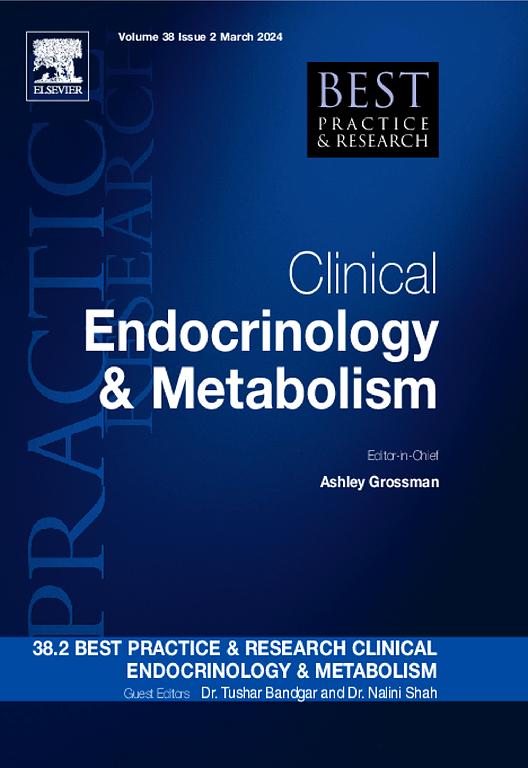Hypothalamus-sparing surgery in craniopharyngiomas: Oncological and hypothalamic long-term outcomes
IF 6.1
1区 医学
Q1 ENDOCRINOLOGY & METABOLISM
Best practice & research. Clinical endocrinology & metabolism
Pub Date : 2025-09-01
DOI:10.1016/j.beem.2025.102039
引用次数: 0
Abstract
Although craniopharyngiomas (CPs) are typically histologically benign and can be cured by radical removal, they are associated with a high level of operative morbidity due to their deep-seated, highly functional location. During the previous decades, the surgical philosophy has changed from radical removal to more restrained strategies of subtotal resection followed by radiotherapy to preserve the integrity of the hypothalamus. However, with improved surgical techniques and the availability of novel molecular diagnostic and therapeutic tools, the concept of hypothalamus-sparing CP surgery should be revised. From an oncological point of view, gross total resection (GTR) should be attempted as it can provide lifelong freedom from disease. However, less than total resection is necessary in cases of hypothalamic infiltration, as hypothalamic damage is unacceptable. The extended transsphenoidal approach (eTSA) promises reduced hypothalamic manipulation compared to the traditional transcranial approach (TCA). There is strong consensus that hypothalamic morbidity is reduced if CP surgery is performed in specialized high-volume neurosurgical centers. Novel targeted therapies (TT) in PCP enables the possibility of biopsy only in selected patients with high-risk CP. This review aims to provide a practical approach to current strategies and concepts in hypothalamus-sparing surgery for CP, with special regard to oncological outcome, hypothalamic and endocrine morbidity, and quality of life.
保留下丘脑手术治疗颅咽管瘤:肿瘤和下丘脑的长期预后。
虽然颅咽管瘤(CPs)在组织学上通常是良性的,可以通过根治性切除来治愈,但由于其深层、高功能的位置,其手术发病率高。在过去的几十年里,手术理念已经从根治性切除转变为更克制的次全切除和放疗策略,以保持下丘脑的完整性。然而,随着手术技术的改进和新的分子诊断和治疗工具的可用性,保留下丘脑的CP手术的概念应该修订。从肿瘤学的角度来看,应该尝试大体全切除(GTR),因为它可以提供终身免于疾病。然而,在下丘脑浸润的情况下,不完全切除是必要的,因为下丘脑损伤是不可接受的。与传统的经颅入路(TCA)相比,扩展经蝶入路(eTSA)有望减少下丘脑操作。有强烈的共识,下丘脑发病率降低,如果CP手术是在专门的大容量神经外科中心进行。PCP的新型靶向治疗(TT)使高风险CP患者仅能够进行活检。本综述旨在为当前的下丘脑保留手术治疗CP的策略和概念提供实用的方法,特别是考虑肿瘤预后、下丘脑和内分泌发病率以及生活质量。
本文章由计算机程序翻译,如有差异,请以英文原文为准。
求助全文
约1分钟内获得全文
求助全文
来源期刊
CiteScore
11.90
自引率
0.00%
发文量
77
审稿时长
6-12 weeks
期刊介绍:
Best Practice & Research Clinical Endocrinology & Metabolism is a serial publication that integrates the latest original research findings into evidence-based review articles. These articles aim to address key clinical issues related to diagnosis, treatment, and patient management.
Each issue adopts a problem-oriented approach, focusing on key questions and clearly outlining what is known while identifying areas for future research. Practical management strategies are described to facilitate application to individual patients. The series targets physicians in practice or training.

 求助内容:
求助内容: 应助结果提醒方式:
应助结果提醒方式:


